
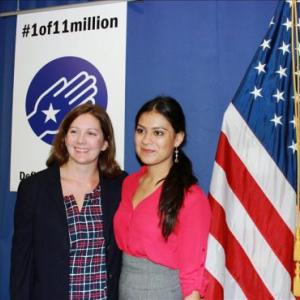
I absolutely love to read, and anyone who is familiar with Oscar Wilde I’m sure recognizes the quote I have chosen for my title; “To define is to limit.” From the moment I read this in The Picture of Dorian Gray, I thought to myself: this is me; this is how I see the world. Now I know people argue with this quote because a definition is a precise statement of what a word means. But just think of “define” as “label.” When you put a label on someone, you classify and constrict them, which limits them from breaking out their true potential.
For example, when we are constantly talked about as illegal aliens, we are given the image of harsh criminals. This image affects our self esteem and our confidence. Some, like Aly Wane, start to believe that there is something evil inside of them. It also limits us from reaching out to the American people and proving to them that we are not here to cause any harm. We only want the opportunity of seeking a brighter future. We are not criminals. We have done what we had to do, what any human would do, to seek a violence-free life, to keep our families together, or, like me, to pursue an education. I am one of 11 million, and each one of us has a different story to tell.
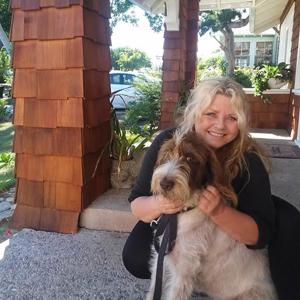
Midnight. 80 degrees. Palm trees, illuminated by the airport lights, lining the street. My dream was now a reality. Germany to Miami. I did it. I moved to America!
When I was 12, my family vacationed in upstate New York. From then on, I knew I wanted to live in America. When other children dreamed of becoming policemen, rock singers, and cowboys, my perpetual childhood dream was to become an American. I devoured books by German author Karl May, about an Apache warrior named Winnetou. His pride and honor started my fascination with this country.
I was 16 when I finished school in Germany, 17 when I finished school as an exchange student, and was 20 when I moved to Miami. I fell madly in love and we moved to Los Angeles. After some time, we moved to Detroit and got married. Then we broke up.
The breakup forced a brief pause as I unwillingly moved back to Germany to reset my visa. Before I left Detroit, I had set up an interview with another freight forwarder in Hamburg, under the condition that they would send me back to the U.S. I never, ever gave up on America — it was never, ever a consideration. Within ten days of arriving in Hamburg, I was at my new job at the German Freight Forwarder. Ten months later, I was back to my America — assigned to Houston.
When they moved me to Atlanta, I remarried. He was a contractor, and I quit my freight job so we could renovate houses together. Unfortunately, the relationship didn't work out. I thought I didn't need to worry about the visa situation because I was married to a U.S. citizen. Had our relationship worked out, I would have been on track for a temporary green card. I was single again, so I was in violation of my H1B visa — and of the five companies in Atlanta that I could have worked at, none of them had job openings.
I found a glimmer of hope — maybe I could switch to an entrepreneur visa. I quickly found an attorney to take my case, but later found out that he never filed anything.
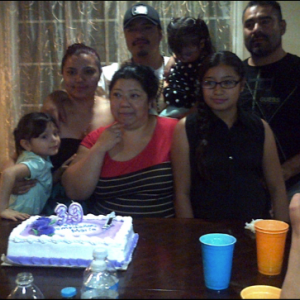
America was a free country. There, freedom is everything. Growing up, that was the picture I had. America was the country where you’re free to do whatever you want.
It all changed when I turned 16. I woke up excited, ready to go to the DMV and get my driver’s license like all my friends were doing -- and then my parents told me that I was here illegally. I was undocumented. Reality sunk in. America was not a free country for me.
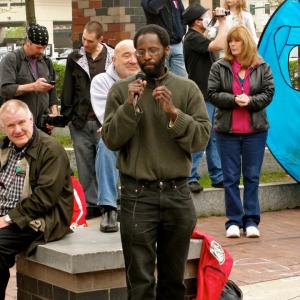
Last week would have been the 71st birthday of my mother who was tragically killed abroad 15 years ago. Because of my undocumented status, I still have not been able to visit her grave site. This experience is all too common in the undocumented community. This is one of the many reasons why, despite the fact that I am an American by default, I struggle with my connection with this country and with the very concept of citizenship.
My mother brought me here legally when I was 9 in 1985 after fleeing our home country of Senegal following a painful estate dispute once my biological father passed away. She found work as a diplomat at the United Nations, and I came here as her dependent. I then attended high school at Georgetown Preparatory School in Washington, D.C., and thus switched to a student visa. I continued my education in Philadelphia at the University of Pennsylvania for two years but had to leave because I couldn’t afford the tuition. My mother was in Zimbabwe then and I couldn’t afford going to join her. Unfortunately, neither my diplomatic visa nor my student visa statuses count towards getting a Green card. When I left school, my status lapsed, and I became undocumented. Three years later, my mother was killed — a victim of domestic violence. With no “home country” to go back to and no way to adjust my status, I had to adjust myself to a life in the shadows.
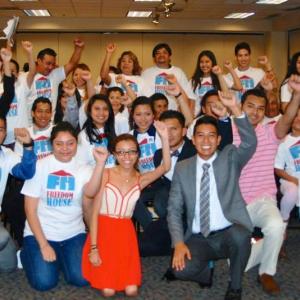
"Whoever welcomes one such child in my name welcomes me, and whoever welcomes me welcomes not me but the one who sent me.” —Mark 9:37, NRSV
I was raised in a family with strong beliefs in our faith. It is because of my faith that I continue to strive for a better future and do good to others. This is why I’m so passionate for my advocacy in education, regardless of gender, race, and immigration status.
When I lived in Mexico, I thought about America every day. To me, America was a country of freedom, a country where every dream could come true. My grandparents waited 12 years to get their visas. The wait was agonizing; every year we faced poverty and struggle in Zacatecas. With every year, my dreams of a better life in America got farther and farther away. The feeling of hopelessness was overwhelming and pushed me to attempt suicide.
In that moment, I turned to faith. My family came to my aid and helped me through. Knowing how desperate for opportunity I had become, my parents reached out to my aunt in the United States. Together, they saved enough money to pay for my visa application. I finally had a chance at a life outside of our small family farm.
It was the summer of 2009 when I finally arrived in America. I was 16.
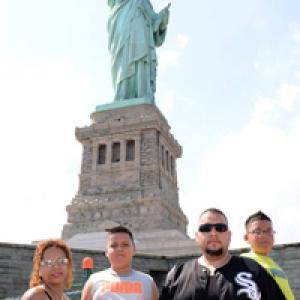
My sons, Issac and Felipe are my pride and joy. My wife and I go to church with them every Sunday, and we spend our free time at the movies or enjoying a walk through downtown Chicago. We also take road trips, one of which brought us to New York City where we visited the Statue of Liberty and Ellis Island.
I brought them there because I wanted them to see
the most important American monument in person. The Statue of Liberty is the icon of freedom and a historic welcoming signal to immigrants.
Chicago is my home. It's been that way for the past 17 years. I'm a maintenance worker at a residential building and a member of SEIU Local 1. I'm kind of living the American dream. I say "kind-of" because my undocumented status has prevented me from pursuing better job opportunities. I had the chance to become an assistant engineer at my building but declined the offer because I'm scared of losing the job if my bosses discover that I'm undocumented.